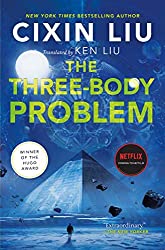When I started reading the science-fiction novel “The Three-Body Problem” by Cixin Liu, I had great expectations from it. It had been nominated for, and had won, many awards. It was praised highly by not just the usual suspects, but even folks like Barack Obama, George R. R. Martin, et al. In hindsight, I was bound to be disappointed by going in with such high expectations. The book turned out to be good, but not great.
The story starts with the horrors of the Chinese Cultural Revolution as experienced by physicist Ye Wenjie, progresses to her forced participation in the environmental destruction done in its wake, and then describes a top-secret project at the time in China to make first contact with an alien civilization in which she ends up playing a crucial part. The message sent via the project is actually received by people on Trisolaris, a planet caught up in a devastating three-star system with a civilization that is repeatedly almost completely wiped out by the extreme conditions in the system. The aliens then plan to invade and occupy Earth with the help of discontents on Earth and with a devious plan to stall scientific progress till their actual arrival more than four centuries later using ingenious devices called “Sophons”.
The author does not shy from venturing into theories in physics and their impliciations. They examine how traumatic experiences change the moral compass of individuals and can cause fatal disaffection in them. They also explore how the very prospect of first contact with an alien civilization affects human behavior and shapes civilization on Earth without the contact even having taken place. I therefore feel that there is a good balance of “science” and “fiction” in this science-fiction novel unlike many books in this genre. That said, if you have read the classics by Asimov, Clarke, et al this book does not break new ground as far as I can tell, despite all the flowery praise seen in the blurbs on the back-cover as well as the inside of the book.
I also felt the language of the book to be a bit stilted and awkward, perhaps due to the translation from the original Chinese into English. I found it amusing that almost everything and everyone of significance in this book is in China – this is a nice counter to the usual US-centric perspective in such books and films, but that does not make it any less jarring. I actually found it pleasantly surprising that so much implied criticism of the Cultural Revolution made it past the censors in China.
I like science-fiction, but I am not an ardent fan pursuing the genre across various kinds of media. Given that, I liked the book in general and would recommend reading it, albeit with few expectations and discarding all the hype around the book.
When I started reading the book, I did not know that it is merely the first volume in a trilogy of books. Now I am wondering whether I should pursue reading the other two parts of the trilogy or whether I should just let it be. (Since I generally liked the book, and since I am a sucker for closure, I very well might read all the books in the trilogy anyway.) Apparently there is a film as well as a TV-series planned to be produced as adaptations of these books, continuing the glorious modern tradition of milking an “asset” for all it is worth via franchises.
